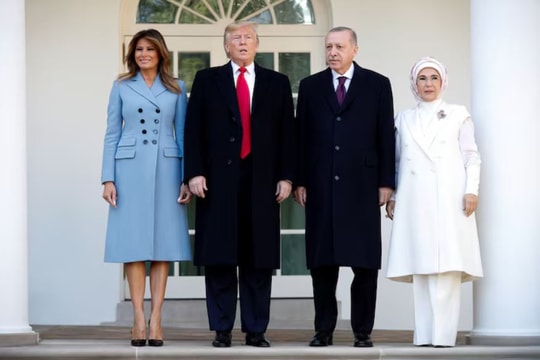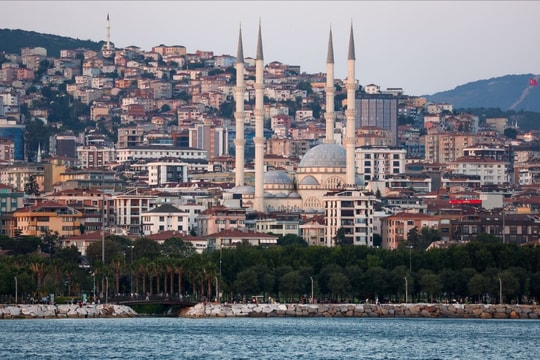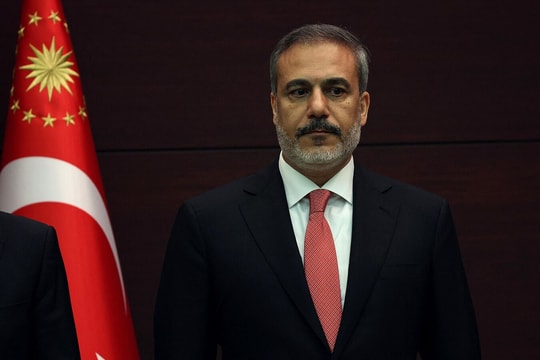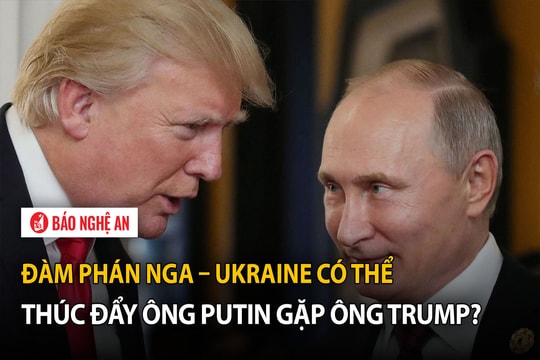The mysteries surrounding the failed coup in Türkiye
(Baonghean) - The failed coup that took place exactly one year ago has had a profound impact on the life of contemporary Türkiye. Unable to remove President Recep Tayyip Erdogan from power, this event has tightened his grip on the country, creating a political space to impose a state of emergency, causing hundreds of thousands of people to lose their jobs and tens of thousands of people to go to jail.
The failure of the coup is clear, but doubts remain about what happened in this bloody event…
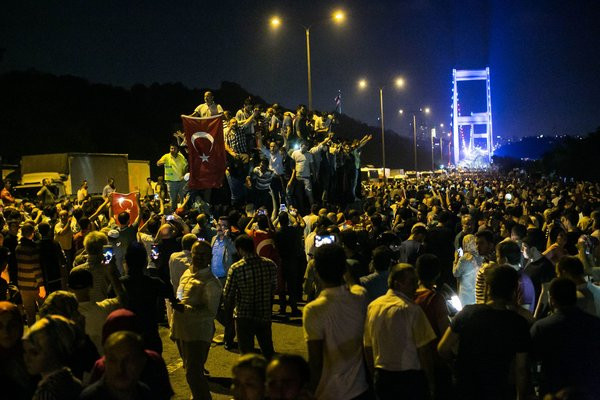 |
| Protesters seize tanks during a failed coup attempt in mid-July 2016 in Türkiye. Photo: AFP/Getty |
Who is involved?
The Turkish government has insisted that the attempted coup, which left 240 people dead, was masterminded by Fethullah Gulen, a Muslim cleric and former Erdogan ally who is now in exile in the United States. Gulenists have infiltrated Turkish state institutions for decades. Indeed, there is substantial evidence that Gulenists were involved in the coup. For example, two civilian Gulenists, Adil Oksuz and Kemal Batmaz, were arrested near the air base that was seen as the coup’s “brain” point. Hulusi Akar, a loyal army chief captured by the plotters, later claimed that a general linked to the coup had asked him to speak to Gulen by phone. And Akar’s aide, who helped detain him on the night of the coup, confessed to being a Gulenist—albeit under duress.
But what is unclear is whether the Gulen “clique” acted on its own. Some alleged Gulenists have admitted to participating in the coup attempt, but have denied any links to Mr. Gulen. On that fateful night, it took some generals more than three hours to publicly voice their support for Mr. Erdogan, leading to speculation that some of them may have initially supported the coup, only to “change course” when it was about to collapse.
The European Union (EU) intelligence agency has therefore declared that it believes the coup plotters include many elements: secularists, opportunists and the Gulen faction. Officials of this agency and German intelligence have both affirmed that they do not believe that Mr. Gulen personally ordered the coup.
Controlled coup?
The indictment against the coup plotters said Turkish intelligence officials were warned of the uprising at least six hours before it began on the evening of July 15, 2016. A major known by the initials “OK” was tasked by the coup leaders with helping to kidnap the head of Turkish intelligence, Hakan Fidan. But OK reported the plan to Fidan’s office around 3:30 p.m. that afternoon, and Mr. Akar was informed later. The major’s affidavit said he warned immediately that the kidnapping could be part of an attempt to overthrow the government.
As a result, some analysts found the subsequent response from Mr. Fidan and Mr. Akar oddly slow and disjointed. In his statements to Parliament, Mr. Fidan said that he did not call the president’s office until 7:26 p.m. that night, and did not speak to the president or explain to Mr. Erdogan’s subordinates exactly what was going on. Later, Mr. Fidan calmly met with a Syrian opposition leader as if nothing was amiss.
Mr Akar said he did not order the Turkish air force to land until around 6:30 p.m., and only ordered the blockade of certain military bases. He also raised eyebrows by taking months to submit his testimony to the parliamentary inquiry into the coup.
Mr Erdogan’s own account also raises questions about the sequence of events. In an account posted on the president’s website, Mr Erdogan said he was first alerted to unusual military activity by his brother-in-law at 4:30 p.m. He tried to contact Fidan and Akar around 5 p.m. but no one answered.
The lack of clarity about what happened in the hours leading up to the coup last July has led Türkiye’s opposition to speculate that the government may have allowed or even encouraged the coup, in order to justify a subsequent crackdown. The leader of Turkey’s largest opposition party, Kemal Kilicdaroglu, described what happened as a “controlled coup”.
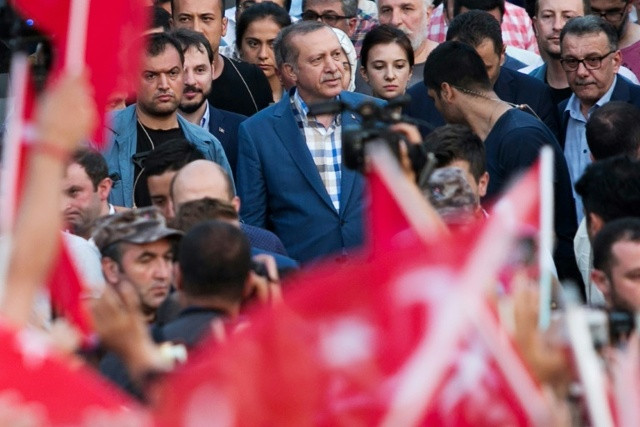 |
| President Recep Tayyip Erdodan (center) addresses the public after the coup. Photo: Internet |
Why did the coup fail?
When the coup began, mutinous soldiers blocked roads and bridges around 10:30 on Friday night – a time when most Turks were still awake, and thus an odd time to start an operation that depended on surprise. Some observers believe the coup was supposed to happen later that night, but was brought forward because the coup leaders realized their plans had been exposed.
Other decisions are harder to explain. The plotters seized the state-run TRT television channel early in the evening but left most of the country’s private television channels largely untouched. Those channels had been broadcasting government officials all night, allowing the government to control the narrative. And while the plotters sought to capture Mr. Erdogan, there was little effort to round up other key government figures.
The attempt to kidnap Mr Erdogan also went awry. The soldiers sent to arrest him did not arrive at his resort until several hours after the coup began. In a recent court hearing, one of them, Brigadier General Gokhan Sonmezates, testified that they had been ordered to wait – a decision he himself found strange: “Who tricked us and made us wait for four hours?”
What do foreign powers know?
In Türkiye, foreign governments were said to have been slow to react to events, leading Erdogan supporters to suggest that the coup had received public support, or at least occurred with advance knowledge from Turkey’s allies, including the United States. There is no evidence to support this theory, but Mr. Gulen’s presence in the United States has fueled speculation that foreign officials must have been tipped off.
The testimony of Michael T. Flynn, a retired US general who later served briefly as President Trump’s first national security adviser, seems to reinforce this impression. Speaking at the time of the coup, Mr. Flynn said he had been briefed on the operation by a friend, a Turkish military officer, and expressed support, though he later reversed himself and blamed Mr. Gulen, raising doubts about whether Mr. Flynn was actually well informed at the time.
According to another report, the Russian government knew about the coup plans and warned the Turkish government. A representative of the Ankara mayor told The Hurriyet that Aleksandr Dugin, a Russian scholar with ties to the Kremlin, had warned Turkish lawmakers and intelligence about unusual military activity before the coup.
Where is Adil Oksuz?
Adil Oksuz, a theology professor, was one of two civilian Gulenists arrested near the air base the morning after the coup. He was accused of leading the coup. Two days after his arrest, he was released on the orders of a judge who later confirmed he was also a Gulenist. Once free, Oksuz disappeared and his whereabouts have been the subject of much speculation.
Pro-government media outlets have hinted that the US is hiding Oksuz, citing sources who claim that US consular officials tried to contact him on July 21, 2016. For its part, the US Embassy in Ankara said it was simply trying to inform him that his US visa had been revoked at the request of the local government. A year has passed, and the answers to the above mysteries will certainly be something that the public will continue to search for and hope to "unveil" in the coming time.
Thu Giang
(According to New York Times)
| RELATED NEWS |
|---|

